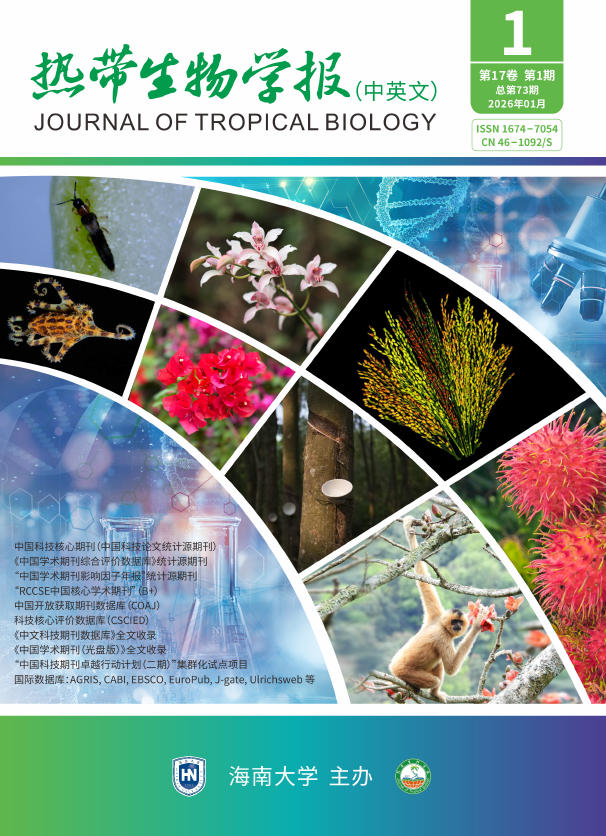"Journal of Tropical Biology", the English title of the publication, is a bilingual Chinese-English journal issued bimonthly. Sponsored by Hainan University and administratively supervised by the Department of Education of Hainan Province, it is distributed both domestically and internationally. The journal holds the domestic serial number CN 46-1092/S and the international standard serial number ISSN 1674-7054.
In May 2009, authorized by the General Administration of Press and Publication of China, the publication formerly titled *Journal of South China University of Tropical Agriculture* was renamed "Journal of Tropical Biology". Its inaugural issue under the new title commenced publication and distribution in March 2010. Transitioning to a bilingual format in June 2025, the journal achieved a composite impact factor of 1.618 on the China National Knowledge Infrastructure (CNKI) platform that same year, maintaining a stable position within the Q2 quartile of the agricultural sciences comprehensive category.
The journal is currently indexed in major databases including the China Academic Journal (CD Edition), China Science and Technology Journal Database, and the Wanfang Data Knowledge Service Platform. It has been consistently recognized as a "Chinese Science and Technology Core Journal" (Source Journal for Chinese Scientific and Technical Papers and Citations) by the Institute of Scientific and Technical Information of China since 2013.
In 2024, the journal was selected for the "Excellence Action Plan for China STM Journals (Phase II)" cluster pilot project, becoming a founding member of both the China University Science and Technology Journals Consortium and the Chinese Academy of Engineering Journals Alliance. That year, it also received the "2024 Outstanding Journal of Hainan Province" award. In 2025, it was designated as an "RCCSE Chinese Core Academic Journal" and received the "Exemplary Converged Media Unit" and "Excellence in Editorial Style" awards from the Demonstration Case Repository for the Development of Chinese Agricultural Journals.
Furthermore, since 2024, the journal has been successively indexed in internationally prominent databases including Ulrichsweb, CABI, EuroPub, EBSCO, FAO AGRIS, and J-Gate.
Purpose: Adhere to the guidance of Xi Jinping Thought on Socialism with Chinese Characteristics for a New Era, uphold the principle of unifying academic freedom with academic norms, encourage constructive academic debates, and stimulate innovation vitality while strictly abiding by the bottom lines of research ethics and biosafety. Adhere to the strategic direction of the "Four Orientations" — orienting towards the world's scientific and technological frontiers, the main economic battlefield, the country's major needs, and people's life and health. Implement the policy of "Letting a hundred flowers bloom and a hundred schools of thought contend" and practice the development philosophy of surviving by quality, promoting development through characteristics, and taking innovation as the driving force. Commit to building a high-level communication platform for showcasing the latest scientific and technological achievements in tropical biology to support the development and utilization of tropical biological resources, and promote the progress of biology and related fields. Rely on the geographical advantages of tropical regions and Hainan Island, highlight Hainan's tropical characteristics, and demonstrate the disciplinary features, school-running philosophy and journal-running direction of the new Hainan University. Strive to improve the ability to obtain scientific and technological information required for scientific research, education and production in the field of life sciences. Enable domestic and foreign scientific and technological workers to efficiently understand the development dynamics of tropical biology, global trends in tropical biological science and technology, and the latest scientific ideas and methods through reading this journal. Contribute to promoting the sustainable development of tropical biological scientific research, teaching and production in China.
Target: Scientific research and teaching personnel mainly engaged in scientific research, education and production activities in the field of tropical life sciences, as well as agricultural and forestry scientific and technological workers, and teachers and students of agricultural and forestry colleges and universities.
Development Orientation: Facing the world and rooted in Hainan, the journal is committed to becoming a first-class high-quality academic journal in China, advancing towards an internationally renowned journal, and continuously improving academic quality. Give full play to the guiding role, scientific nature and reference value of this journal in various fields related to tropical biology, and focus on collecting manuscripts reflecting the hot topics and cutting-edge trends of various disciplines in the field of tropical biology. Prioritize stabilizing and attracting excellent domestic manuscripts, and gradually attract high-quality international manuscripts through strengthening international cooperation, so as to lead disciplinary development and enhance the international influence of the journal.
Scope: Select and publish basic theoretical and applied research achievements, innovative technologies and practical methods in the field of tropical biological science in China. Focus on academic papers, while also accepting manuscripts such as research reports, experimental summaries, special reviews and academic discussions that have certain theoretical depth and practical value.
Coverage: The latest research progress and achievements in scientific fields including tropical crops, plant protection, tropical environmental protection, tropical marine organisms and aquaculture, horticulture, prevention and control of alien species invasion, biodiversity and ecological culture, One Health, and protection, planning and utilization of plant germplasm resources.











 Email alert
Email alert RSS
RSS